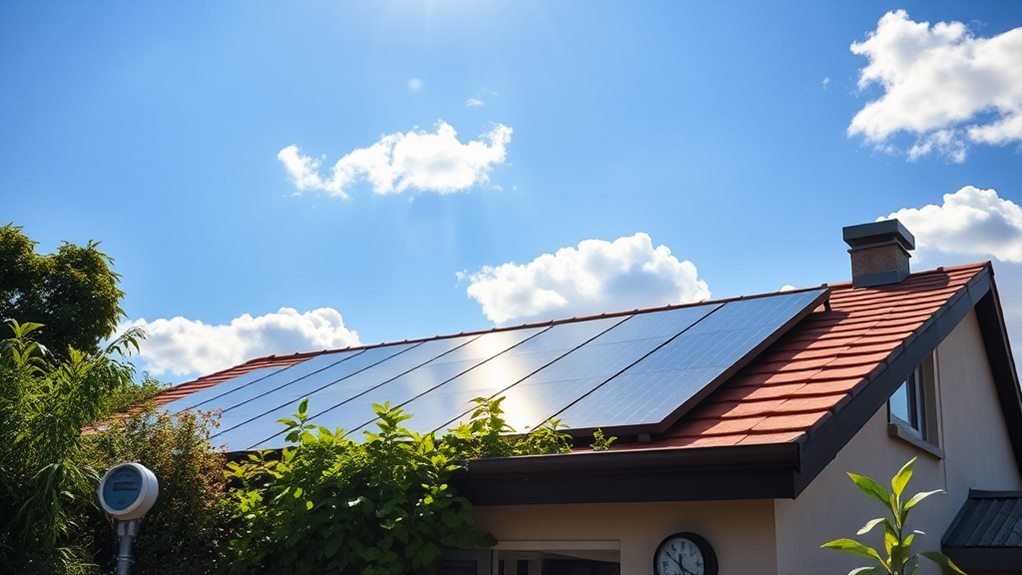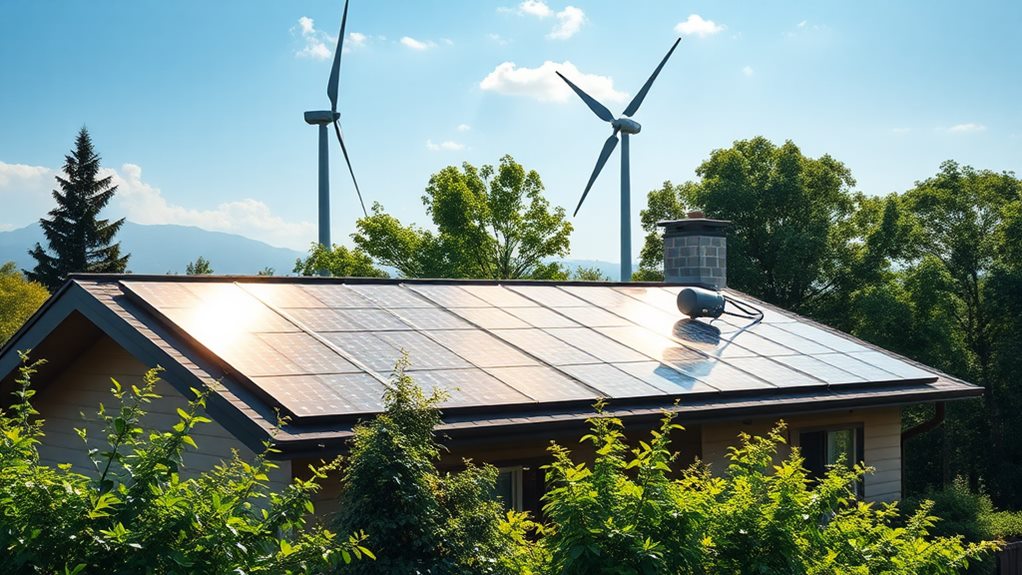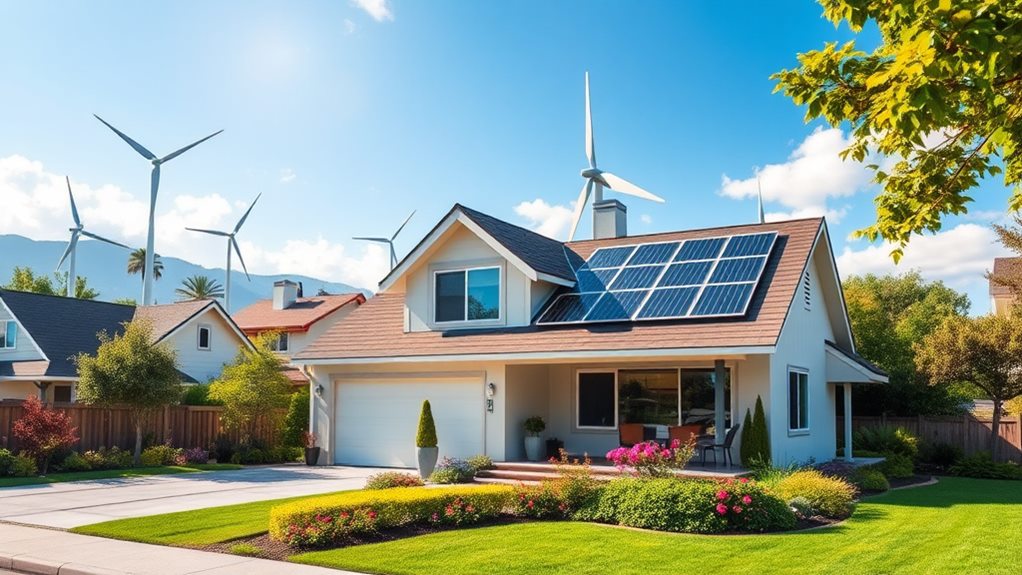Releasing homeowner advantages with renewable energy, particularly solar, can lead to significant cost savings and increased property value. You can reduce your monthly electricity bills by up to 60%, and homes with solar panels often sell for around 4.1% more. Federal tax credits covering 30% of installation costs make this investment more accessible. Additionally, the long-term financial benefits, coupled with a reduced environmental impact, enhance overall homeownership experience. By generating your own electricity, you gain energy independence while contributing to a cleaner environment. To understand the full scope of these benefits, there's more to explore.
Understanding Solar Panel Benefits

Often, homeowners find that investing in solar panels brings a wealth of benefits that go beyond just saving on energy bills. One of the main advantages of solar energy is the significant cost savings; many homeowners report reductions of up to 60% on their monthly electricity consumption once their system is operational.
Additionally, solar systems can operate on cloudy days, storing power for later use, which guarantees a consistent energy supply. Not only does this lower your energy bills, but it also enhances your home's resale value, as studies indicate properties with solar energy systems can sell for around 4.1% more than those without.
Furthermore, you can take advantage of federal tax credits, such as the 30% federal tax credit for solar installations, which can substantially decrease your upfront costs. By making the switch to solar, you also contribute to a cleaner environment, reducing your carbon footprint and reliance on traditional power sources leading to sustainable energy practices.
The installation process may seem intimidating, but joining the growing community of renewable energy users promotes energy independence and supports local sustainability efforts. Ultimately, solar panels offer an opportunity to harness a renewable energy source while enjoying long-term financial and environmental benefits.
Cost Considerations for Homeowners
Investing in solar panels not only provides numerous benefits but also involves some important cost considerations for homeowners. The average cost of solar panel installation has dropped by approximately 70% over the last decade, making renewable energy more accessible. This notable reduction in costs is part of a broader trend that encourages homeowners to adopt cleaner energy solutions and contribute to a greener energy future.
When you consider this investment, you can expect to save between $10,000 to $30,000 on energy bills over the lifespan of your solar system, depending on your location and energy usage.
Federal tax credits can cover up to 30% of the total installation costs, greatly reducing your upfront investment. Additionally, many states offer further incentives, such as rebates or property tax exemptions, which can alleviate the financial burden of moving to renewable energy.
Financing options are also available, including zero down payment plans and flexible loan terms ranging from 12 to 25 years. These options make it easier for homeowners like you to adopt solar energy without immediate out-of-pocket costs.
Installation Process Overview

Before you plunge into the world of solar energy, it's important to understand the installation process. First, a site assessment is conducted to evaluate your property and determine the best placement for your solar panel system. This assessment allows for customization that meets your specific energy needs.
Additionally, exploring solar energy incentives can help make your installation more affordable. Once the design is settled, you'll need to secure the necessary permits, which can vary by location.
After obtaining permits, you can schedule professional installation. This typically takes one to three days, depending on the size and complexity of your system. Skilled installers guarantee that everything is set up for peak performance and safety.
Once installed, your solar panels will operate quietly, requiring minimal maintenance while providing substantial energy savings.
If you're considering solar energy during home construction or remodeling, integrating the installation process can reduce overall costs. Soon after installation, you can expect a noticeable drop in energy bills, paving the way toward potential energy independence.
Environmental Impact of Solar Energy
Once you've navigated the installation process, you'll quickly realize the profound environmental benefits that solar energy brings. By utilizing solar power, you greatly reduce your reliance on fossil fuels, which leads to a remarkable decrease in greenhouse gas emissions—an estimated 121-138 metric tons of CO2 per acre annually. This shift not only mitigates the harmful effects of climate change but also contributes to cleaner air and water, as solar energy avoids the pollutants and heavy metals associated with fossil fuel extraction and combustion.
Additionally, partnering with a reputable provider like Upper Solar guarantees that you receive high-quality solar panels designed for peak performance, further enhancing the positive impact of your solar system on the environment quality solar installations.
Moreover, solar energy systems typically have a low environmental footprint, requiring minimal land use and producing no harmful emissions during energy generation. As a renewable source, solar energy plays an essential role in promoting sustainability and energy independence. By harnessing the sun's abundant energy, you can generate your own clean energy, fostering a greener future.
Moving to solar energy can lead to a staggering 70% reduction in carbon emissions for the average homeowner over the lifespan of the solar system. Embracing solar power not only benefits you but also contributes positively to the environment, paving the way for a more sustainable world.
Long-Term Financial Advantages

Many homeowners find that switching to solar energy can lead to significant long-term financial benefits. By installing solar panels, you could reduce your monthly electricity bills by up to 60%, resulting in considerable long-term savings.
The initial investment may seem intimidating, but federal tax credits can alleviate this burden, covering up to 30% of your installation costs. This makes adopting renewable energy not just environmentally friendly, but financially viable.
Achieving energy independence is another major advantage. By generating your own electricity, you lessen reliance on utility companies, shielding yourself from unpredictable utility bills and rising energy costs.
Over the lifespan of your solar system, the savings can accumulate to thousands of dollars, often allowing you to break even within 5 to 10 years.
Furthermore, solar panel systems can enhance your home's resale value, averaging an increase of $15,000. This solid return on investment provides homeowners with a financial edge when selling their property.
Final Thoughts
Incorporating renewable energy, particularly solar panels, can greatly enhance your homeownership experience. By reducing long-term energy costs and contributing to environmental well-being, you're not just investing in your property but also in a sustainable future. With the installation process becoming increasingly streamlined, isn't it time to reflect on how solar energy can transform your home? Embracing this technology not only benefits your wallet but also paves the way for a cleaner planet for generations to come.


Recent Comments